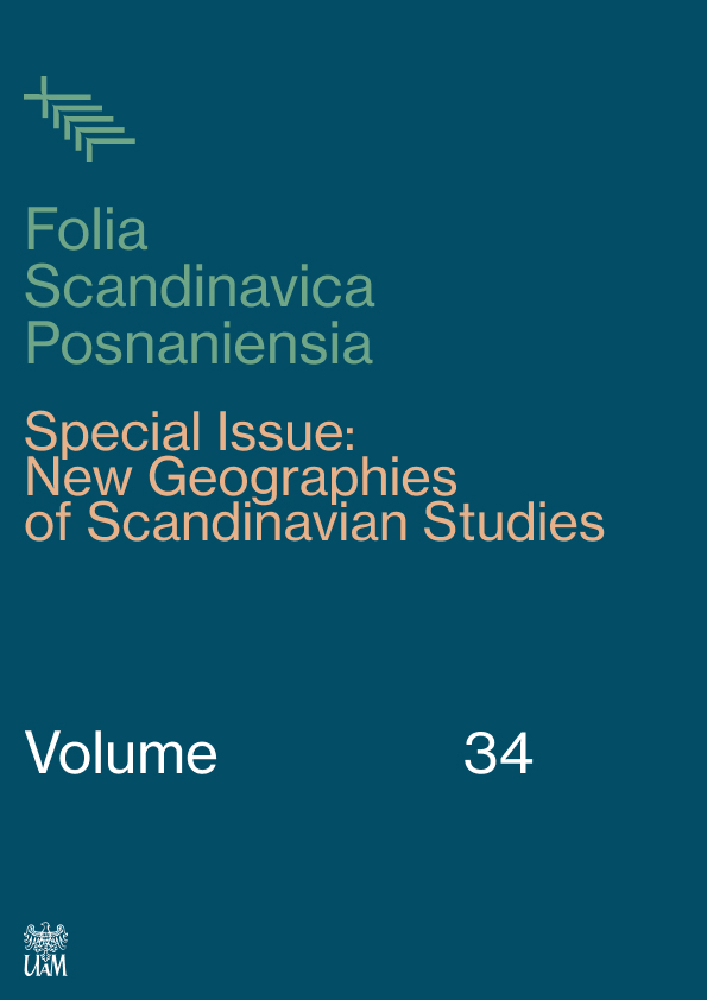Abstract
The research question this article tries to answer is: how was Scandinavia “invented” in Polish prose written when the Iron Curtain still physically divided Europe? The text discusses three novels written by Joanna Chmielewska (1932–2013) and published in 1969 (Krokodyl z Kraju Karoliny [The Crocodile from Caroline’s Country]), 1973 (Lesio) and 1974 (Wszystko czerwone [All in Red]). Chmielewska, a vastly popular Polish crime novelist, especially known for the creation of the so-called “ironic crime” sub-genre, often introduced depictions of Denmark and the country’s inhabitants in her novels and used them to demonstrate amusing contrasts between them and her Polish protagonists and their reality in Poland. My goal is to show that while Westerners constructed and exoticized the East, Easterners did the very same thing to the West, only using different values and criteria in order to distinguish between “us” and “them”. We should therefore perhaps start talking about “inventing Europe” or “inventing Europes” – where the West invents the East and the East invents the West, and xenostereotypes introduce and reinforce autostereotypes. Those stereotypes can sometimes become so extreme that they are no longer sustainable and “collapse” under their own weight.
References
Chmielewska, J. (1993–2008). Autobiografia (vol. 1–7). Warszawa: Vers.
Chmielewska, J. (1996 [1974]). Wszystko czerwone. Warszawa: Vers.
Chmielewska, J. (1997a [1969]). Krokodyl z Kraju Karoliny. Warszawa: Vers.
Chmielewska, J. (1997b [1973]). Lesio. Warszawa: Vers.
Chmielewska, J. (2004). Kocie worki. Warszawa: Kobra.
Chmielewska, J. (2010). Byczki w pomidorach. Warszawa: Klin.
Chmielewska, J. (2013). Życie (nie)całkiem spokojne. Warszawa: Klin.
Czapliński, P. (2016). Poruszona mapa. Wyobraźnia geograficzno-kulturowa polskiej literatury przełomu XX i XXI wieku. Kraków: Wydawnictwo Literackie.
Czapliński, P. (2020). Literature and geography. Translated by Marcin Tereszewski. Porównania 2(27), 143–166. DOI: https://doi.org/10.14746/por.2020.2.8
Domogalla, A. (2008). Rosyjska powieść kryminalna XX–XXI wieku: (wokół przemian gatunkowych). Rusycystyczne Studia Literaturoznawcze 20, 71–83.
Drozdowska, K. (2021). The Others from across the sea – Eastern Europe and Eastern Europeans in modern Norwegian literature. Archiwum Emigracji 28(2020), 292–305. DOI: https://doi.org/10.12775/AE.2020.020
Gazdecka, E. (2016). Czy Joanna Chmielewska pisała kryminały? Zeszyty Naukowe Uniwersytetu Zielonogórskiego, Seria Scripta Humana 5, 279–286. DOI: https://doi.org/10.59444/2016SERredRus_Kul1r22
Golnau, M. (2017). Pół żartem, pół serio – czyli kryminał ironiczny w Polsce i w Rosji. Tutoring Gedanensis 2(1), 106–110.
Index Translatorium (undated). Joanna Chmielewska. Retrieved from https://www.unesco.org/xtrans/bsresult.aspx?lg=0&a=Chmielewska&fr=0/ (accessed 1 April 2022).
Matyszczak, M. (2016). Kopenhaga tropem Joanny Chmielewskiej. Kawiarenka kryminalna.pl. Retrieved from https://www.kawiarenkakryminalna.pl/podroze/739-kopenhaga-tropem-joanny-chmielewskiej/ (accessed 1 April 2022).
Mälksoo, M. (2009). The memory politics of becoming European: The East European subalterns and the collective memory of Europe. European Journal of International Relations 15(4), 653–680. DOI: https://doi.org/10.1177/1354066109345049
Money.pl (2013). Nie żyje Joanna Chmielewska. Retrieved from https://www.money.pl/archiwum/wiadomosci_agencyjne/iar/artykul/nie;zyje;joanna;chmielewska,186,0,1396666.html (accessed 3 April 2022).
Mrozewicz, A. E. (2018). Beyond Eastern Noir. Edinburgh: Edinburgh University Press. DOI: https://doi.org/10.1515/9781474418119
Musiał, K. & Bartnik-Światek, D. (2016). Rozmrażanie Wschodu. Najnowszy duński dyskurs o Polsce. In: T. Zarycki (ed.), Polska jako peryferie (pp. 254–267). Warszawa: Scholar.
Musiał, K. & Chacińska, M. (2013). Constructing a Nordic community in the Polish press – Past and present. In: J. Harvard & P. Stadius (eds.), Communicating the North. Media structures and images in the making of the Nordic region (pp. 289–318). Farnhamn: Ashgate Publishing.
Newsweek.pl (2013). Joanna Chmielewska nie żyje. Retrieved from https://www.newsweek.pl/kultura/joanna-chmielewska-nie-zyje-newsweekpl/ftx64hj (accessed 03 April 2022).
Said, E. D. (1978). Orientalism. New York: Random House.
Schab, S. I. (2018a). Palimpsest polski. Reprezentacje Polski i Polaków w duńskich relacjach podróżniczych. Poznań: Wydawnictwo Naukowe UAM.
Schab, S. I. (2018b). Wschodnie tropy zbrodni. O Polsce we współczesnej duńskiej powieści kryminalnej. In: M. Sibińska & H. Dymel-Trzebiatowska (eds.), Dialogi o kulturze, kultura dialogu (pp. 251–260). Gdańsk: Wydawnictwo Uniwersytetu.
Solum O. (2016). Populærkulturell suksess og velferdssamfunnets mørke bakside. In: E. Oxfeldt (ed.), Skandinaviske fortellinger om skyld og privilegier i en globaliseringstid (pp. 133–150). Oslo: Universitetsforlaget. DOI: https://doi.org/10.18261/9788215028095-2016-07
Wolff, L. (1994). Inventing Eastern Europe: The map of civilization on the mind of the Enlightenment. Palo Alto: Stanford University Press.
Wordpress.com (undated). Joanna Chmielewska – Im dalej w las, tym większy kryminał. Retrieved from https://joannachmielewska.wordpress.com/ (accessed 1 April 2022).
Żak, E. (2016). Rola powieści kryminalnej we współczesnej rosyjskiej kulturze masowej. Kultura Słowian. Rocznik Komisji Kultury Słowian PAU XII, 113–131.


